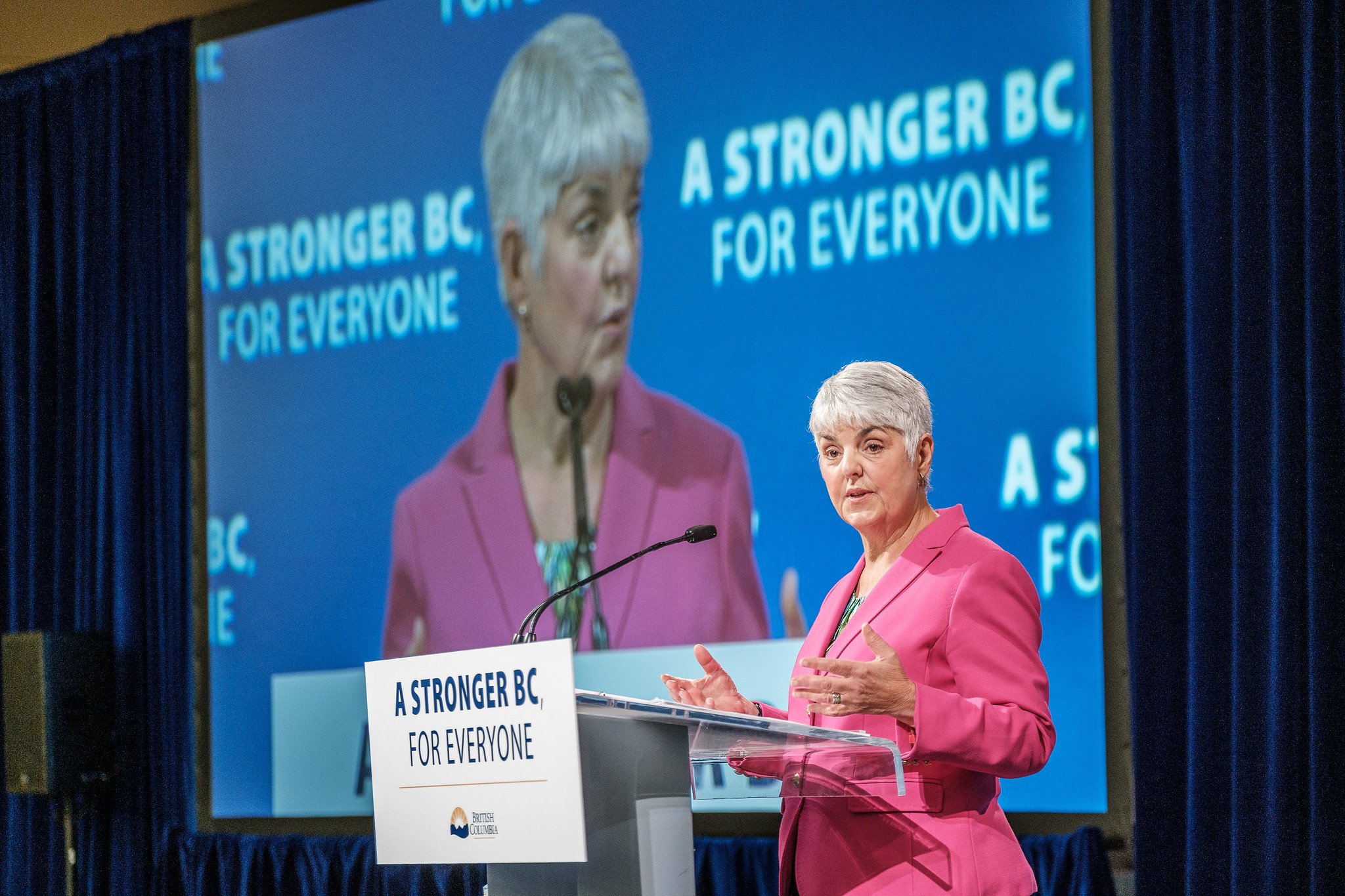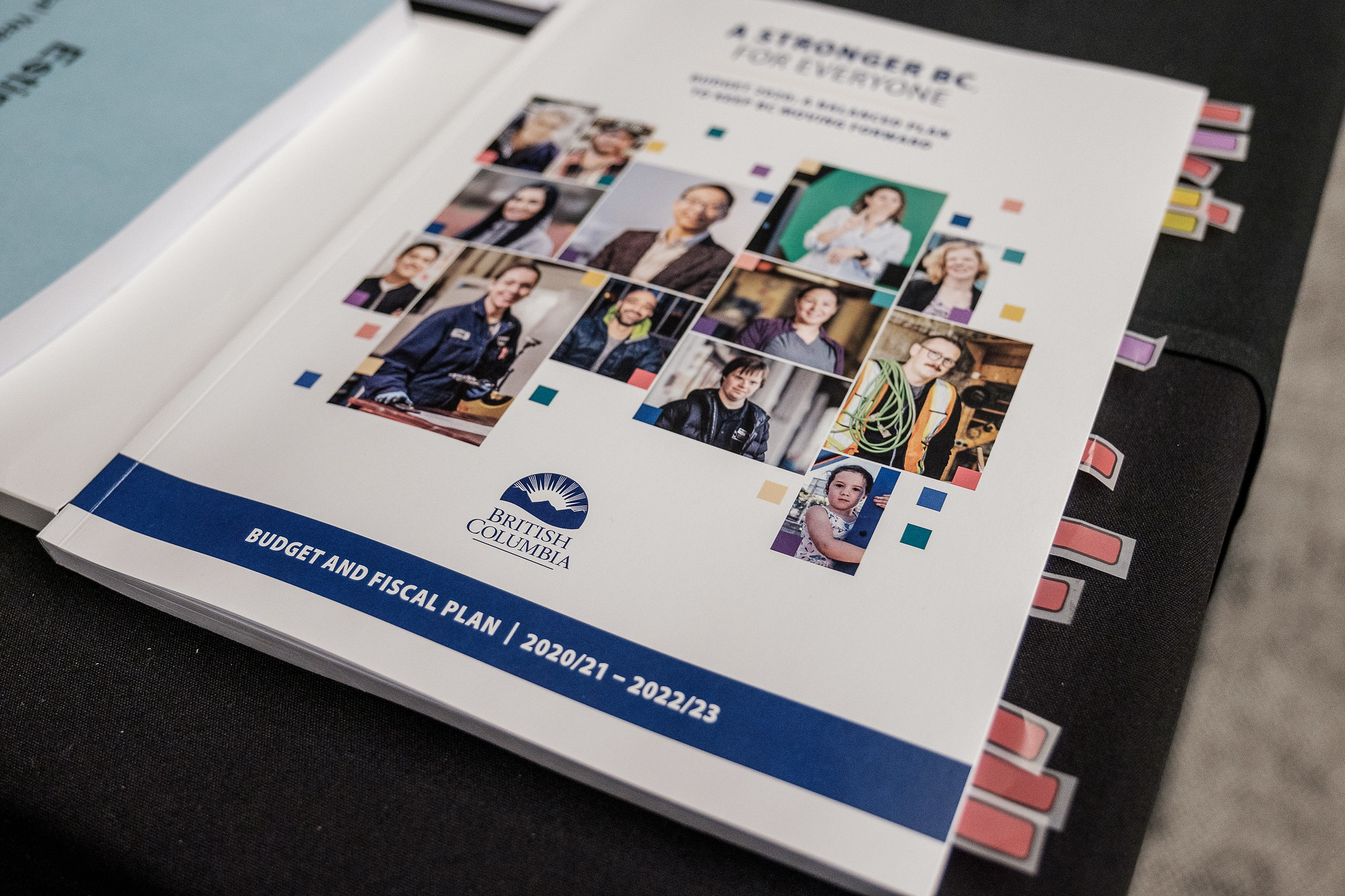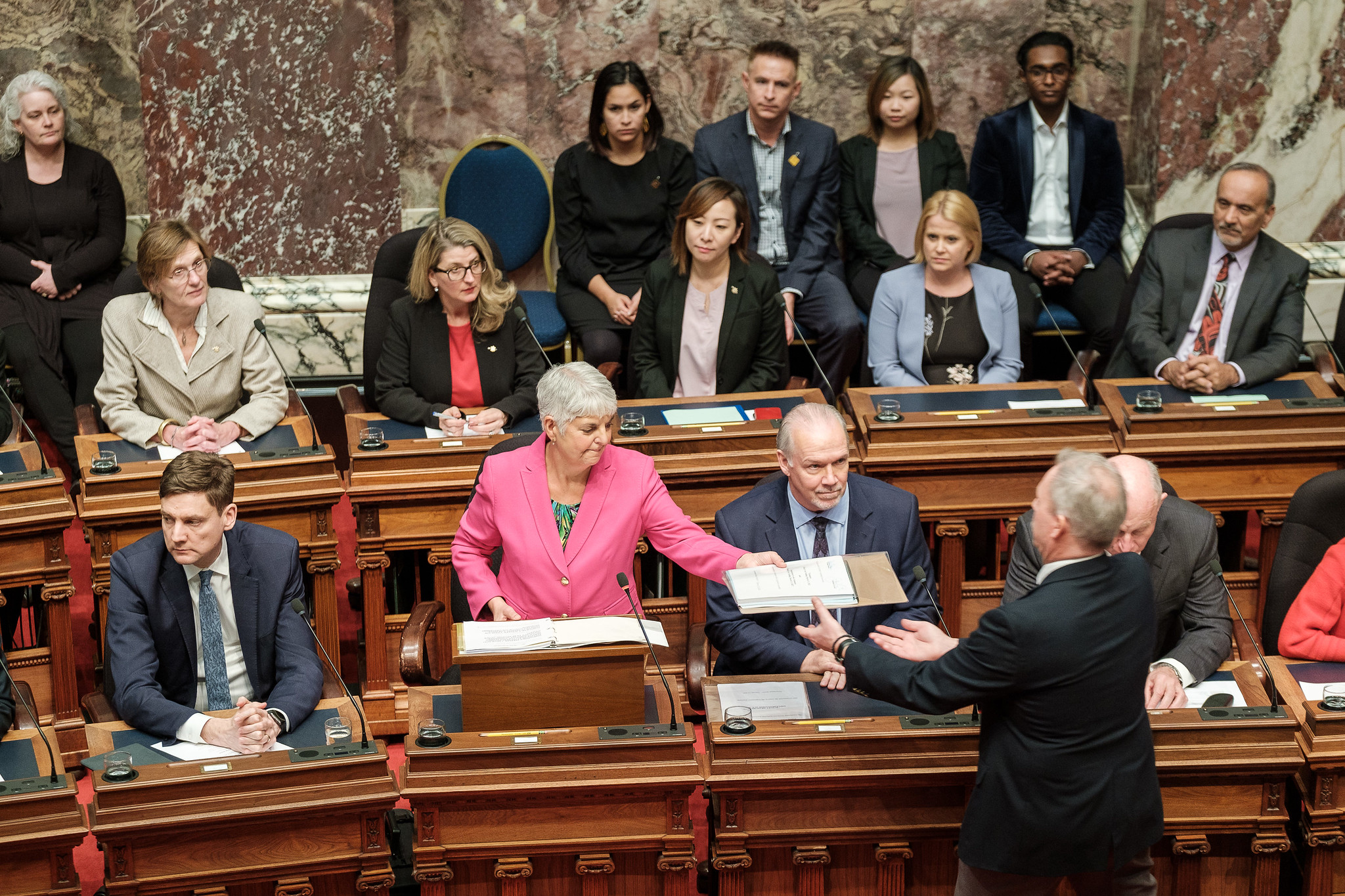B.C. Budget 2020: Balanced budget continues B.C. NDP investment in affordability, services and economy

Recommended articles
On related topics
What you need to know
The B.C. Government has unveiled a ‘stay-the-course’ balanced budget. It’s focused on the continued implementation of NDP commitments to improve public services, boost the economy by investing in infrastructure and to make life more affordable for average British Columbians.
Highlighting the budget is the implementation of two previously announced measures – the new B.C. Child Opportunity Benefit and the elimination of Medical Services Plan premiums. Record spending on schools, hospitals and roads also continues.
Two new revenue measures will generate headlines – a new tax bracket on high-income earners and a tax on soft drinks – but of greater concern to the government and British Columbians are the forecasts of declining corporate tax revenues, slowing economic growth, and higher unemployment.
| 2019-2020 | 2020-2021 | 2021-2022 | 2022-2023 | |
|---|---|---|---|---|
| Surplus | $203 million | $227 million | $179 million | $374 million |
| Revenue | $59.326 billion | $60.585 billion | $62.366 billion | $64.211 billion |
| Expenses | $58.823 billion | $60.058 billion | $61.887 billion | $63.537 billion |
| Forecast allowance | $300 million | $300 million | $300 million | $300 million |
Revenue
| 2019-2020 | 2020-2021 | 2021-2022 | 2022-2023 | |
|---|---|---|---|---|
| Income tax | $11.022 billion | $11.771 billion | $12.294 billion | $12.833 billion |
| Corporate tax | $5.008 billion | $4.739 billion | $4.926 billion | $5.232 billion |
| Property | $2.917 billion | $3.026 billion | $3.169 billion | $3.316 billion |
| Health premiums | $1.065 billion | $0 | $0 | $0 |
| Carbon Tax | $1.690 billion | $1.954 billion | $2.181 billion | $2.183 billion |
| Natural Gas Royalties | $153 million | $207 million | $218 million | $223 million |
| Forests | $991 million | $867 million | $829 million | $811 million |
| ICBC | -$91 million | $86 million | $148 million | $191 million |
Capital Spending
| 2019-2020 | 2020-2021 | 2021-2022 | 2022-2023 | |
|---|---|---|---|---|
| Capital spending | $9.549 billion | $10.535 billion | $10.603 billion | $11.509 billion |
| Debt to GDP ratio | 14.6% | 15.5% | 16.3% | 17.1% |
Economic Outlook
| 2019-2020 | 2020-2021 | 2021-2022 | 2022-2023 | |
|---|---|---|---|---|
| Growth | 1.8% | 2.0% | 1.9% | 1.9% |
| Population Growth | +1.4% | +1.4% | +1.3% | +1.3% |
| Jobs | 2.559 million | 2.585 million | 2.611 million | 2.638 million |
| Unemployment | 4.7% | 5.1% | 5.3% | 5.3% |
| Exports | -1.1% | 0.6% | 1.4% | 2.1% |
| Housing starts | 44,932 | 35,021 | 32,040 |
Making life more affordable
New measures for children and families, lower auto insurance rates, the elimination of health premiums and more grants for post-secondary education and training highlight B.C. Government efforts to make life less expensive for British Columbians.
- The new B.C. Child Opportunity Benefit launches in October. It’s a monthly tax-free payment that will provide 290,000 families with more money to support their kids. The government estimates this will mean families with one child will receive up to 1,600 annually, families with two children will receive up to $2,600, and it’s up to $3,400 for three kids.
- Medical Services Plan premiums have been eliminated. This will be the first year British Columbians won’t have to pay the premium, saving people up to $1,800 per year.
- Drivers will see auto insurance fees decrease by an average of 20%, or $400 a year for all drivers, as a result of the move to a no-fault system at ICBC.
- 40,000 low- and middle-income students will receive up to $4,000 to help with upfront costs of tuition through the new BC Access Grant, which will provide new, needs-based support for post-secondary education and training.
 Minister Carole James delivers the 2020 Budget to stakeholders and journalists. Photo credit: Province of British Columbia
Minister Carole James delivers the 2020 Budget to stakeholders and journalists. Photo credit: Province of British Columbia
Improving public services
Health care, education and affordable housing continue to be the focus of government investment in the delivery of public services.
- Health care will see $1 billion in new investments over three years, for reducing surgical wait times, boosting long-term care and respite services, 24/7 mental-health support services for post-secondary students, and the operation of new urgent and primary care centres.
- Education will get $339 million over the next three years to hire teachers, psychologists and counsellors, and improving classroom education.
- Child care continues to benefit from government support, with parents who get a spot in new licensed child care spaces saving up to $20,000 per year between various programs.
- Housing remains a focus, with the budget continuing the rollout of the Homes for BC program, including funding for new homes, 200 units of new supportive housing, and funding for the ongoing public inquiry into money laundering in B.C.
Building a sustainable economy
Infrastructure remains the primary focus of the government’s efforts to grow the economy, with 2020 forecast to see the largest public sector investment in schools, hospitals and roads in British Columbia’s history. The government is making these investments itself, via taxpayer-supported provincial entities, and through its expanded CleanBC climate change plan.
Over the next three years, the government will:
- Invest in new hospitals in Vancouver (St. Paul’s), New Westminster, Kamloops, Penticton Regional Hospital and Terrace.
- Build transportation infrastructure including a new Pattullo Bridge, the Broadway Subway in Vancouver along with a renewed SkyTrain fleet, and road and highway improvements across the province.
- Upgrade schools to make them seismically safe and include new child care spaces or neighbourhood learning centres.
- Boost science, trades, technology and health training with investments in the province’s post-secondary education system.
- Make schools, universities and hospitals more energy efficient and support industries to move toward clean, low-carbon technology via the CleanBC climate action plan. The government estimates its investments will stimulate more than 100,000 direct and indirect jobs.
Targeted support for the forest industry is also in the budget. This includes:
- $13 million for forestry revitalization efforts, including programs aiming to convert wood into value-added products like biofuels, bioplastics and textiles.
- Using B.C. engineered wood as a building product in public infrastructure.
- Job placement and skills training, equipment loans for coastal logging contractors, grants for communities, and programs to support early retirement.
Business and industry however expressed concern about the government’s lack of movement on what they call the biggest threat to their global competitiveness – the carbon tax.
- Industry stakeholders across a range of sectors had asked for measures to protect B.C. trade exposed industries, like measures that exist in other provinces and with the federal government (i.e. output-based pricing system)
- Industry says the lack of action will affect the competitiveness of B.C. mining, forestry and other major power users
 Photo credit: Province of British Columbia
Photo credit: Province of British Columbia
Paying for everything
A new income tax bracket on the top 1% of income earners and a new tax on soft drinks highlight new revenue measures introduced by the B.C. Government.
- A new top personal income tax bracket of 20.8 per cent has been introduced on income exceeding $220,000, retroactive to January 1, 2020. This increases the tax rate from 16.8 per cent. The measure is expected to generate $216 million in new revenues in 2020-2021, increasing to $219 million in 2021-2022.
- Soft drinks will lose their provincial sales tax exemption effective July 1, 2020. The government is touting the move as a health measure aimed at reducing the consumption of unhealthy drinks by youth. The measure will generate an expected $27 million in government revenues in 2020-2021, and $37 million in 2021-2022.
- A new vaping tax will establish a 29.5% tax on vaping products effective April 1, 2020. These measures were previously announced by Health Minister Adrian Dix.
Risks to the Budget and fiscal plan
Downside risks to B.C.s economic outlook include the following:
- Uncertainty regarding global trade policies, geopolitical tensions, and broader economic challenges in Asia, Europe and the United Kingdom
- Weak global economic activity, with sowing growth in Asia and other regions, resulting in lower demand for B.C.’s commodity exports
- Higher volatility in international foreign exchange, stock and bond markets
- Lower commodity prices, particularly for lumber, pulp and coal
- Slower growth in domestic residential investment and household consumption
- Timing of investment and hiring related to the LNG Canada project, similar to the risks that exist for other major capital projects
 Minister Carole James delivers the 2020 Budget to the Legislature. Photo credit: Province of British Columbia
Minister Carole James delivers the 2020 Budget to the Legislature. Photo credit: Province of British Columbia
Stakeholder Reactions
“While government has prioritized a variety of worthwhile program areas, including childcare, housing affordability, education, and transit and transportation investments, paying for this requires a competitive and growing economy. The Budget does not pay sufficient attention to the storm clouds facing us due to slower global growth and escalating tax and regulatory costs at home,”
—Jock Finlayson, Business Council of British Columbia
“Budget 2020 was predictable in that it stays the course on balanced budgets, investments in child care, and education. Given the cumulative tax increases, the business community is feeling thoroughly tapped out. The budget included another meaningful increase in tax rates that will impact professionals and offered little to no mention of measures to support economic growth and competitiveness.”
—Bridgitte Anderson, President and CEO of the Greater Vancouver Board of Trade
“A key measure of health for any economy is how it reduces inequality and creates opportunity. On those measures, this budget delivers.”
—Laird Cronk, President of the BC Federation of Labour
“With tuition fees at an all-time high, student debt in BC continues to grow as students and their families struggle to afford the education they need to enter the workforce. The BC Access Grant will help students access not only four-year programs, but certificate and diploma programs that are key for many aspects of the workforce.”
—Tanysha Klassen, Chairperson of the BC Federation of Students
“The Mining Association of BC is deeply disappointed that Budget 2020 does not address the impact of BC’s carbon tax on the industry’s lagging competitiveness or create an environment for future growth and job creation.”
“Once again John Horgan and the NDP have put forward a budget with no economic plan and with the only source of revenue being the pockets of taxpayers. They have squandered the opportunity to help people with no focus on growing the economy or delivering on their promises to make life affordable. No $400 annual renters’ rebate, no $10-a-day childcare, and we’re still 98 years away from the NDP fulfilling their affordable housing target.”
—Shirley Bond, B.C. Liberal Opposition Finance Critic
“By pursuing conflicting agendas, the government's ability to achieve long term prosperity for our province will be limited. Government has to make smarter, more courageous choices that will allow us to meet our targets and embrace new opportunities for economic prosperity, rather than spending significant time and resources to protect the status quo.”
——— Jeffrey Ferrier is a former Vice-President at NATIONAL Public Relations
——— Matt MacInnis is a former Vice-President at NATIONAL Public Relations


